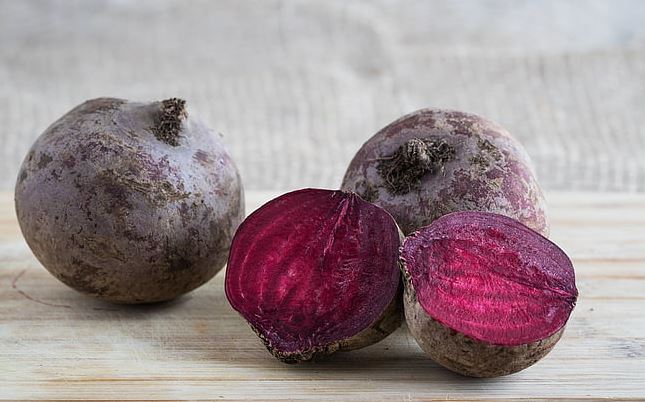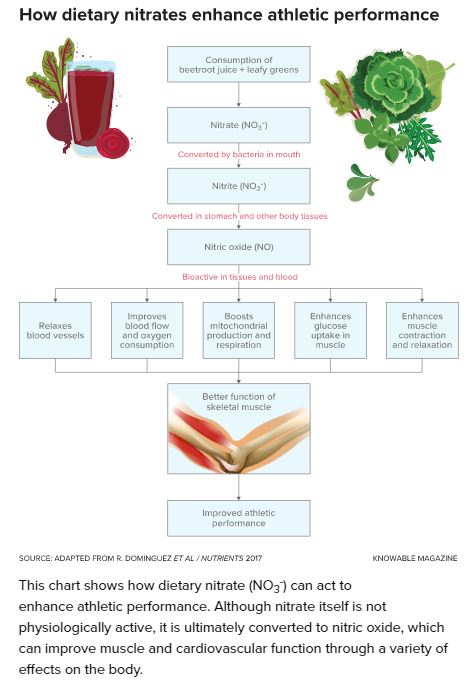Rowers and Athletes and off course their coaches and medical advisers have experimented with a broad range of aids in pursuit of performance edge. One of the legal substances which has been backed by solid data: the juice of beets, for the nitrates they contain. We have come across this wonderful article lately and want to share this with you.
“Beetroot juice makes your blood move”
 Red Beet juice for blood circulation Credit:
Red Beet juice for blood circulation Credit:
Says Rodrigo Pérez Ortega a science writer and intern at Knowable Magazine, which first published this story. “Inorganic nitrate is added to cured and processed meats to extend their shelf life and give them their distinctive pink color. It’s also naturally found in spinach, arugula and beets. In the past decade, new evidence has suggested that the nitrate in these vegetables enhances athletic performance and may also increase cardiovascular health in old age”. The red colors contains Betanine, Betaine (BET) is a native compound widely studied as an antioxidant in agriculture and human health.
Red Beetroot as performance booster – Some studies
A Swedish research group working with cyclists and triathletes found out in 2007, (report) that three days of sodium nitrate supplementation lowered the oxygen demand of nine athletes as they worked out, compared with a placebo of table salt. It also increased the blood plasma levels of nitrite, a byproduct of nitrate. Also, the American Journal of Physiology and the South Corean Kyung Hee University were reporting that Red Beet jouice has positive effects on our heart muscles and our cardio System. And Andrew Jones a physiologist of the University of Exeter in England. Usually, the oxygen demand of exercise is fixed, he says, so for a short-term intervention to change that “was unusual.”
Although it wasn’t clear how nitrate was doing what it did, Jones knew that green leafy vegetables and beets were rich sources. So he conducted a study, reported in the Journal of Applied Physiology, giving eight men active in recreational sports an equivalent amount of nitrate in a natural food source: beet juice. The volunteers consumed either 500 ml (17 ounces) of beet juice or a blackcurrant drink — which has negligible amounts of nitrate — every day for six days. Then, after a break of 10 days, the groups were switched around and drank the other drink for an additional six days.

By the last three days of the six, nitrate concentration in the blood of those drinking beet juice was almost doubled and their systolic blood pressure (which measures the pressure in your blood vessels as your heart beats) fell by an average of 6 points. The oxygen cost — the amount of oxygen consumed — when they exercised on a stationary bicycle was reduced by 19 percent. “When we asked them to continue to exercise to exhaustion, they were able to go longer,” recalls Jones, who co-wrote a review on dietary nitrates in the 2018 Annual Review of Nutrition.
From Catch to Drive<
Nitrate itself doesn’t do much in the body. It first has to be converted to nitric oxide, a gas with numerous physiological roles — in blood vessel dilation, muscle contraction and transmission of nerve signals, among others. Rowers obtain that nitric oxide either through the action of the enzyme nitric oxide synthase, or from nitrate ingested in food
Scientists know that this second route is enhanced under conditions when there is not enough oxygen in muscles, and when acid builds up — exactly what happens in skeletal muscle when it contracts constantly during exercise. So they hypothesize that this pathway is particularly important during exercise as a backup system to ensure that enough nitric oxide gets made in muscles and other tissues.
Once in skeletal muscle, nitric oxide can do several things. It can improve the efficiency of muscle contraction and of energy generation by mitochondria. Both of these could contribute to the lowered oxygen cost of exercise. So could the gas’s property of dilating blood vessels, as it increases blood flow to muscle.
Passing the test
Studies testing the effects of dietary nitrate in different sports are piling up.
In a 2011 study, for example, Jones and his team asked nine competitive male cyclists to drink 500 ml (about 17 ounces) of beetroot juice containing almost 400 mg of nitrate, 2.5 hours before starting a 4 km (about 2.5 miles) or 16.1 km (10 miles) cycling endurance test. Researchers found that the men who drank beet juice improved their performance by 2.8 percent in both tests, compared to men who drank a nitrate-depleted beet juice.
In another study, from 2015, Australian researchers gave five professional female kayakers two 70 ml (2.4 ounces) shots of beet juice, each containing about 300 mg of nitrate, two hours before a test involving kayaking one-third of a mile. Compared with a placebo, the rowers who drank beet juice improved their performance by 1.7 percent.
Beetroot as performance booster: The Rowing conclusion
After many such experiments, mainly in runners and cyclists, researchers have concluded that nitrate supplementation lowers the oxygen demand of exercise and improves performance in endurance sports. They find that beet juice is most effective when drank two to three hours before exercise, and, in general, that 300 to 500 milligrams (500 mg is a bit more than two cups) of inorganic nitrate is enough to provide a 1 to 3 percent improvement in performance — significant enough to give a serious athlete a competitive edge. Imagine a 2000 m race and a time of 7.00 min/ 420 sec’s. This is 4-12 seconds. No doping.
 Beet root as endourance Booster
Beet root as endourance Booster
Sponser Red Beet Juice
You will find our highly appreciated Beet Root concentrate in our shop. This red beet shot has a nitrate content of a 500 ml red beet juice. VinitroxTM, Whey Pepto CFM, L-arginine and L-ornithine also promote the NO-production. FruitflowTM helps to maintain a normal platelet aggregation, which contributes to healthy blood flow. Power athletes confirm that NO-products cause the so-called “pump”.
Red Beet Vinitrox is based on a standardised concentrate of red beet juice as well as on a patented tomato extract and delivers nitrate, polyphenols and special proteins. This increases the nitric oxide production and improves the blood flow thanks to the special tomato extract.





